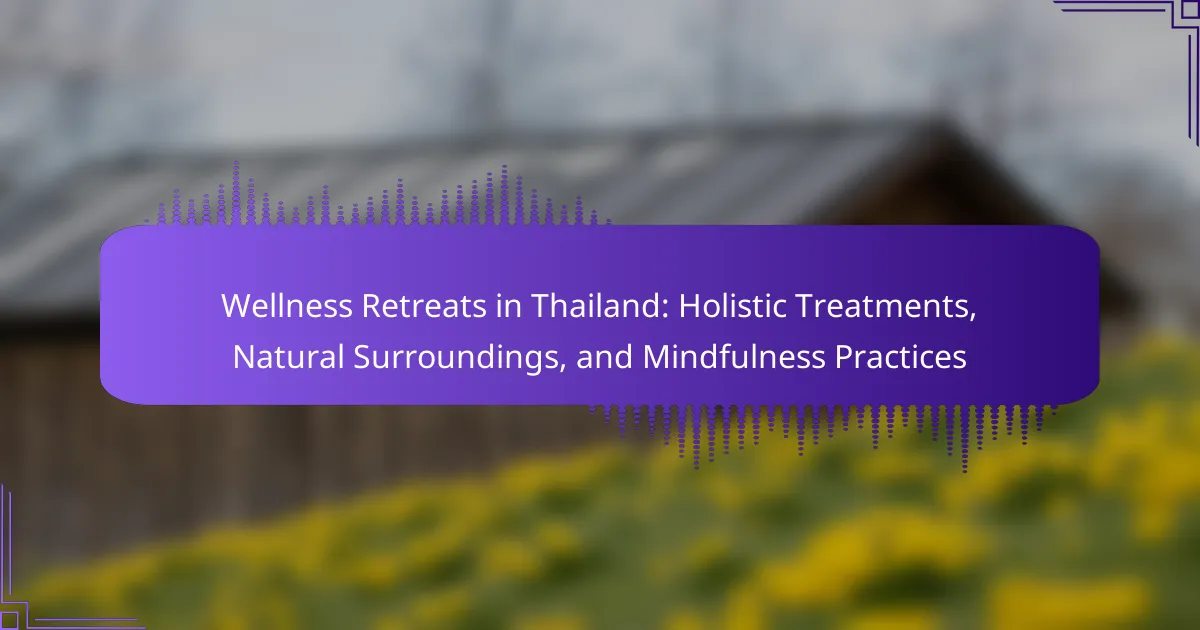Wellness retreats in Thailand provide stress reduction, improved mental clarity, and enhanced physical health through holistic treatments. These retreats feature natural surroundings, mindfulness practices, and personalized wellness journeys. Popular styles include detox programmes, yoga and meditation, and spa treatments. Unique offerings like traditional Thai massage and sound healing enhance the overall experience, catering to diverse demographics and individual needs.
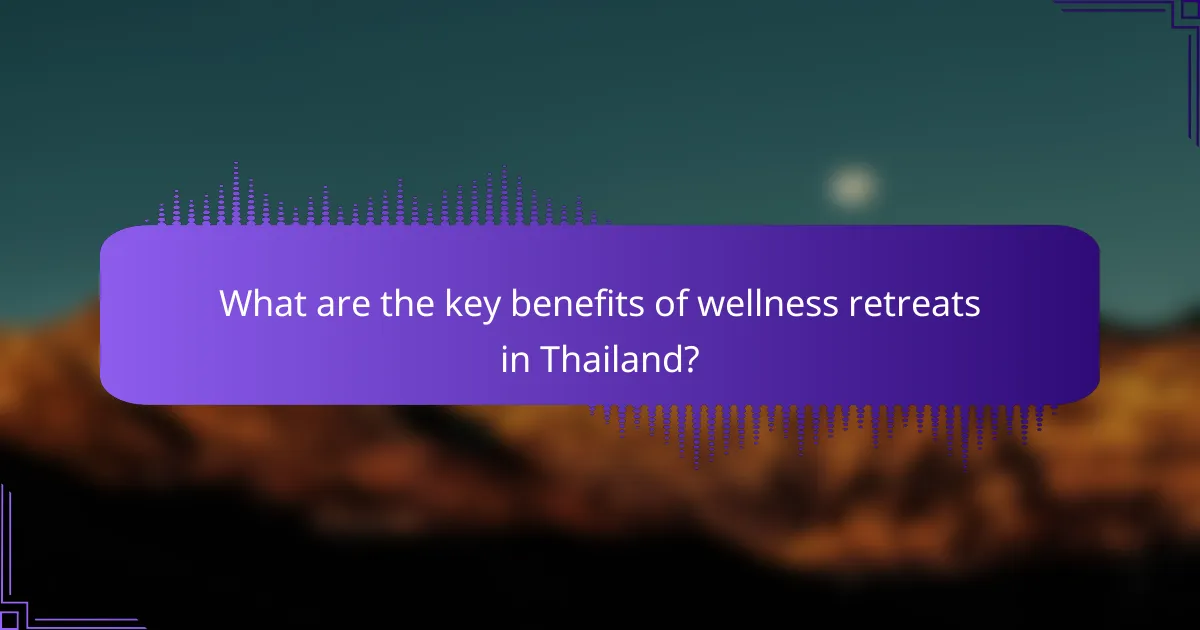
What are the key benefits of wellness retreats in Thailand?
Wellness retreats in Thailand offer numerous benefits including stress reduction, improved mental clarity, and enhanced physical health. These retreats utilise holistic treatments such as yoga, meditation, and traditional Thai healing practices.
Natural surroundings like lush jungles and serene beaches contribute to relaxation and rejuvenation. Mindfulness practices foster self-awareness and emotional balance, promoting overall well-being. Participants often report lasting positive changes in their lifestyle and mindset.
How do holistic treatments enhance physical health?
Holistic treatments enhance physical health by promoting balance, reducing stress, and improving overall well-being. In wellness retreats in Thailand, natural surroundings contribute to relaxation and rejuvenation. Practices like yoga, meditation, and herbal therapies strengthen the body and mind connection. These treatments often lead to increased energy levels and better immune function. Additionally, the serene environment fosters mindfulness, which can reduce anxiety and enhance mental clarity.
What role does natural surroundings play in mental well-being?
Natural surroundings significantly enhance mental well-being by providing tranquility and reducing stress. Immersing in nature during wellness retreats in Thailand fosters mindfulness and promotes relaxation. Studies show that exposure to natural environments can lower cortisol levels, improving overall mood and cognitive function. The unique attributes of Thailand’s lush landscapes and serene beaches create an ideal setting for holistic treatments, allowing individuals to reconnect with themselves and achieve inner peace.
How can mindfulness practices improve emotional resilience?
Mindfulness practices enhance emotional resilience by fostering self-awareness and stress reduction. Engaging in mindfulness during wellness retreats in Thailand cultivates a deeper connection with nature, promoting relaxation and mental clarity. Research indicates that consistent mindfulness practice can lead to improved emotional regulation, allowing individuals to better cope with challenges. Furthermore, holistic treatments offered in these retreats complement mindfulness, creating a comprehensive approach to emotional well-being.
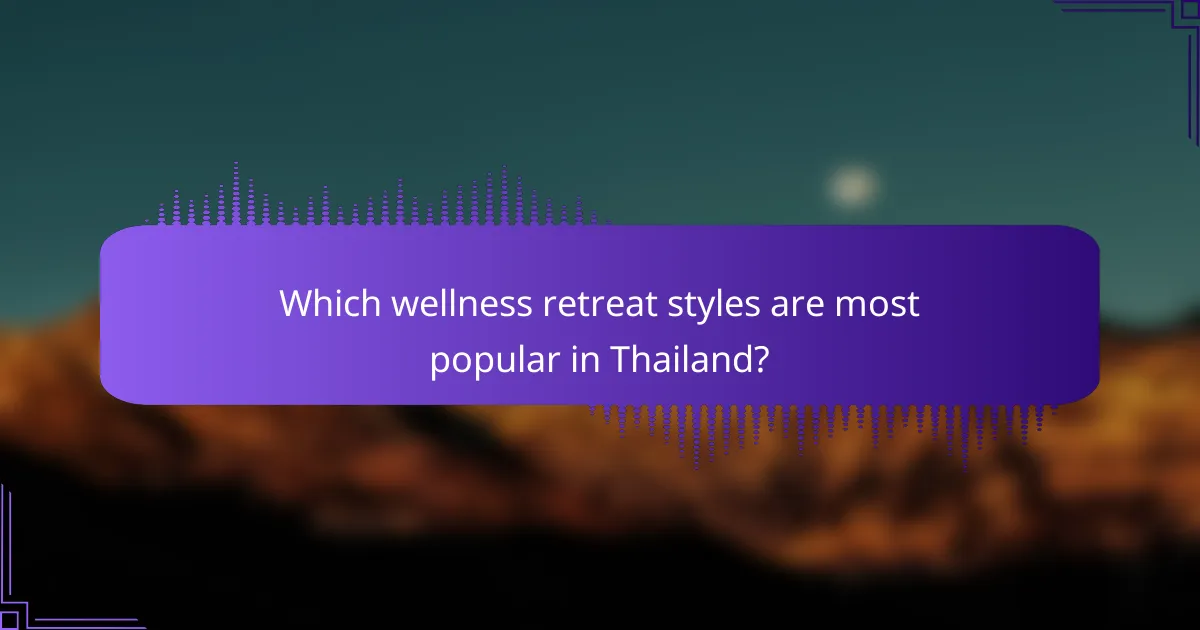
Which wellness retreat styles are most popular in Thailand?
The most popular wellness retreat styles in Thailand include holistic healing, detox programmes, yoga and meditation, spa treatments, and nature immersion. These retreats emphasise natural surroundings, mindfulness practices, and personalized wellness journeys. Holistic healing focuses on physical, mental, and spiritual well-being, while detox programmes cleanse the body. Yoga and meditation retreats promote inner peace and balance. Spa treatments offer relaxation and rejuvenation. Nature immersion connects participants with the tranquil Thai landscape, enhancing the overall wellness experience.
What distinguishes luxury retreats from budget-friendly options?
Luxury retreats offer personalized services, exclusive environments, and high-end amenities, while budget-friendly options focus on affordability and basic comforts. Luxury wellness retreats in Thailand often feature holistic treatments, serene natural surroundings, and advanced mindfulness practices. In contrast, budget-friendly retreats may provide simpler accommodations and fewer specialized services. High-end retreats typically emphasise unique attributes, such as private wellness consultations or gourmet organic meals, enhancing the overall experience.
How do eco-friendly retreats integrate sustainability?
Eco-friendly retreats integrate sustainability through practices that minimise environmental impact and promote ecological balance. They utilise renewable energy sources, such as solar power, and implement waste reduction strategies, like composting and recycling.
These retreats often source food locally, supporting nearby farmers and reducing carbon footprints. Many also incorporate natural building materials and eco-friendly designs to harmonise with their surroundings. Mindfulness practices at these retreats emphasise a connection to nature, fostering awareness of environmental stewardship among participants.
Overall, eco-friendly retreats in Thailand exemplify a commitment to holistic wellness while prioritising sustainability.
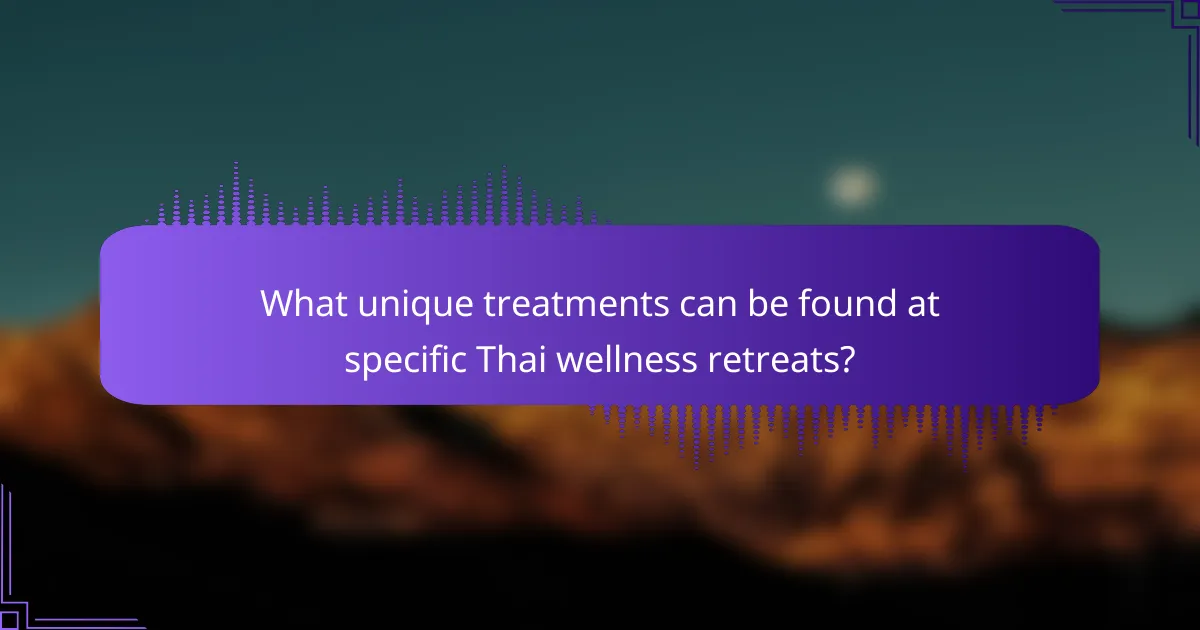
What unique treatments can be found at specific Thai wellness retreats?
Unique treatments at specific Thai wellness retreats include traditional Thai massage, herbal steam baths, and detox programmes. These retreats often combine ancient healing practices with modern wellness techniques. For instance, some offer unique sound healing sessions using Tibetan singing bowls. Others provide customised wellness plans tailored to individual needs, integrating nutrition counselling and mindfulness training. The serene natural surroundings enhance the overall experience, promoting relaxation and rejuvenation.
Which traditional Thai therapies are commonly offered?
Traditional Thai therapies commonly offered in wellness retreats include Thai massage, herbal steam baths, and reflexology. These therapies promote relaxation, pain relief, and overall well-being. Thai massage combines acupressure and stretching, while herbal steam baths utilise local herbs for detoxification. Reflexology focuses on pressure points in the feet to enhance health.
How do modern wellness techniques complement ancient practices?
Modern wellness techniques enhance ancient practices by integrating mindfulness, holistic treatments, and natural surroundings. Wellness retreats in Thailand exemplify this synergy, offering environments that promote relaxation and self-discovery. These retreats combine traditional practices like meditation and herbal therapies with contemporary wellness trends such as yoga and nutrition workshops. This fusion allows participants to experience profound mental and physical benefits, fostering deeper connections to both their heritage and modern health philosophies. The unique setting of Thailand’s landscapes further amplifies these experiences, providing a tranquil backdrop that enriches the overall healing journey.
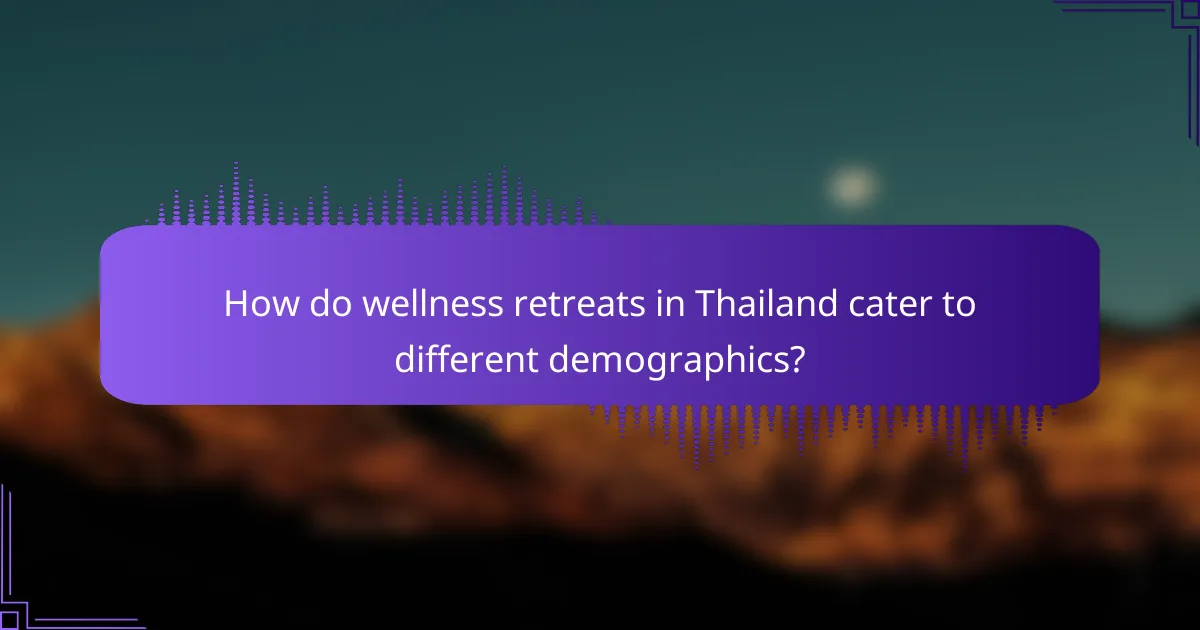
How do wellness retreats in Thailand cater to different demographics?
Wellness retreats in Thailand cater to various demographics by offering tailored programmes. Families can enjoy activities suitable for all ages, while solo travellers find opportunities for personal growth. Couples benefit from romantic packages that emphasise connection. Additionally, wellness retreats provide specialised treatments for seniors, focusing on gentle therapies. Young professionals often engage in stress-relief programmes that blend mindfulness with fitness. Retreats also accommodate health-conscious individuals with organic meals and fitness classes. This diverse approach ensures all guests find relevant experiences.
What experiences do solo travelers seek at wellness retreats?
Solo travellers at wellness retreats seek rejuvenation, tranquility, and a deeper connection with themselves. They desire holistic treatments that integrate traditional practices with modern wellness techniques. Immersion in natural surroundings enhances their experience, providing peace and inspiration. Mindfulness practices, such as meditation and yoga, are essential for cultivating inner calm and clarity. These elements together create a transformative journey, allowing solo travellers to recharge and reflect.
How do group retreats foster community and connection?
Group retreats foster community and connection by creating immersive environments that promote shared experiences. In Thailand, wellness retreats utilise holistic treatments, natural surroundings, and mindfulness practices to enhance interpersonal bonds. Participants engage in activities like yoga and meditation, which facilitate deeper connections. The serene environment encourages openness and vulnerability, leading to lasting friendships. Additionally, group discussions and collaborative workshops strengthen the sense of belonging among attendees.
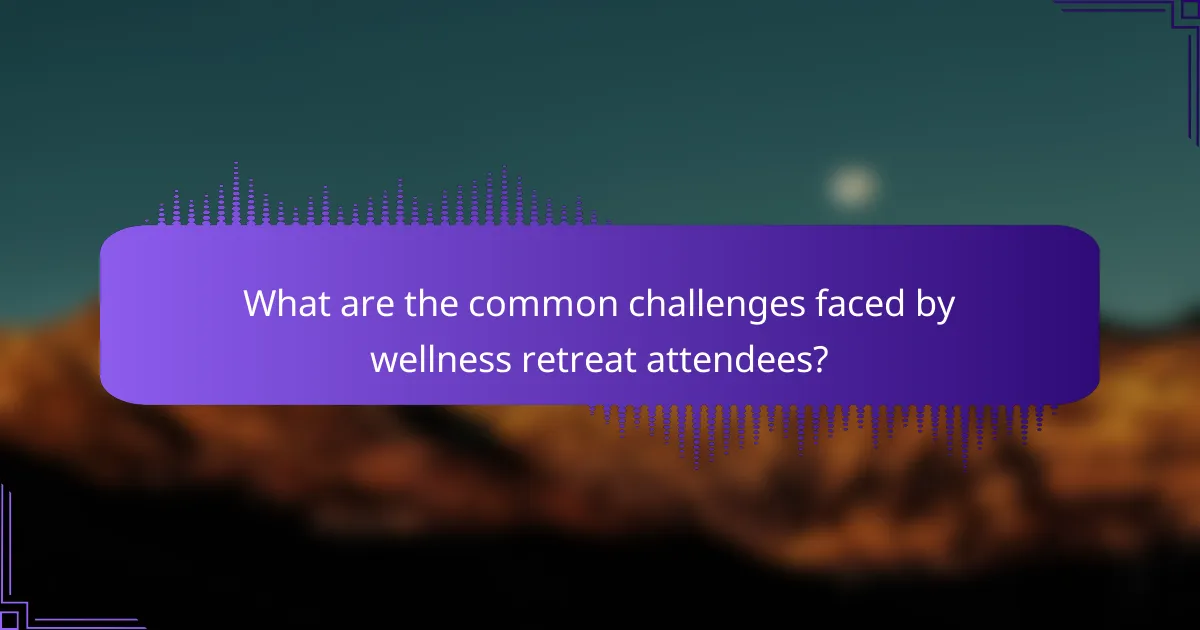
What are the common challenges faced by wellness retreat attendees?
Wellness retreat attendees in Thailand often face challenges such as adjusting to a new environment, managing expectations, and overcoming emotional barriers. Many participants struggle with the transition from daily life to a holistic setting. Additionally, some may find it difficult to fully engage in mindfulness practices due to distractions or preconceived notions about wellness. The unique attribute of these retreats is their focus on integrating natural surroundings, which can sometimes feel overwhelming for newcomers. Lastly, the duration of the retreat can lead to feelings of isolation or homesickness, impacting the overall experience.
How can participants overcome initial discomfort with mindfulness?
Participants can overcome initial discomfort with mindfulness by gradually integrating practices into their routine. Start with short sessions in tranquil settings, such as wellness retreats in Thailand, which offer holistic treatments and natural surroundings. Engaging in guided meditations can help ease anxiety and foster a sense of safety. Practicing mindfulness in nature enhances the experience, as the serene environment positively influences mental well-being. Additionally, connecting with supportive instructors and fellow participants can create a sense of community, making the process more enjoyable and less intimidating.
What strategies help manage expectations during retreats?
To manage expectations during wellness retreats in Thailand, clear communication is essential. Establishing guidelines about treatments, schedules, and outcomes helps participants align their goals with the retreat’s offerings.
Encourage participants to set realistic objectives for their experience. This involves understanding the holistic nature of treatments and the role of mindfulness practices in personal growth.
Provide pre-retreat information detailing what to expect regarding accommodations, activities, and the surrounding natural environment. This transparency fosters trust and prepares attendees for their journey.
Lastly, incorporate feedback mechanisms throughout the retreat. Regular check-ins allow participants to express their feelings and adjust their expectations as needed, enhancing their overall experience.
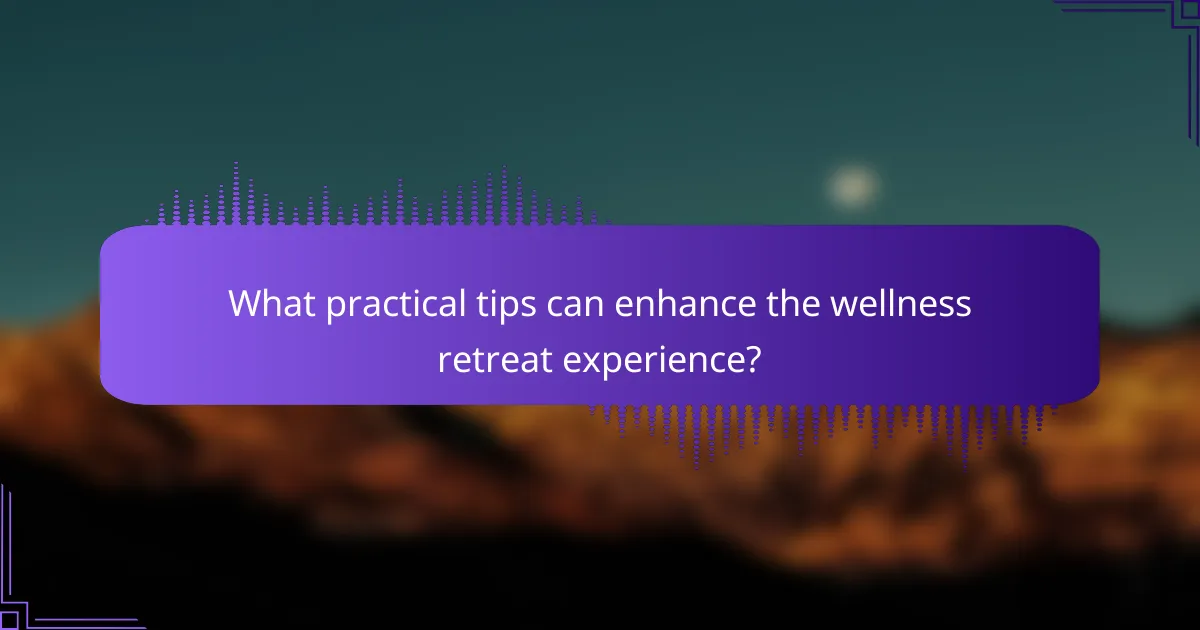
What practical tips can enhance the wellness retreat experience?
To enhance the wellness retreat experience in Thailand, prioritise personal intention, engage in local culture, and embrace nature.
1. Set clear intentions before arrival to focus your retreat experience.
2. Participate in local workshops to deepen cultural understanding.
3. Incorporate daily mindfulness practices like meditation or yoga.
4. Explore natural surroundings through guided hikes or beach walks.
5. Engage with wellness professionals for personalised treatment plans.
6. Disconnect from digital devices to fully immerse in the retreat environment.
How to prepare for a successful retreat?
To prepare for a successful wellness retreat in Thailand, focus on planning, mindset, and essentials. Research locations that offer holistic treatments, natural surroundings, and mindfulness practices. Create a schedule that balances activities and relaxation. Pack appropriate clothing, personal items, and any necessary health supplements. Engage in pre-retreat mindfulness exercises to enhance your experience.
What should participants consider when choosing a retreat?
Participants should consider several factors when choosing a wellness retreat in Thailand. First, evaluate the retreat’s focus on holistic treatments, which may vary from traditional therapies to modern wellness practices. Next, assess the natural surroundings, as tranquil environments enhance relaxation and mindfulness. Additionally, review the types of mindfulness practices offered, ensuring they align with personal goals. Finally, consider the retreat’s duration and schedule to ensure it fits individual needs and commitments.
How to integrate retreat practices into daily life post-visit?
Integrating retreat practices into daily life involves consistent mindfulness and self-care routines. Start by setting aside time daily for meditation or yoga.
1. Establish a morning ritual that includes breathwork or journaling.
2. Incorporate healthy eating habits inspired by the retreat’s nutritional guidance.
3. Create a peaceful environment at home with natural elements like plants or calming scents.
4. Schedule regular digital detox periods to reconnect with yourself.
These practices help maintain the benefits gained during wellness retreats.
